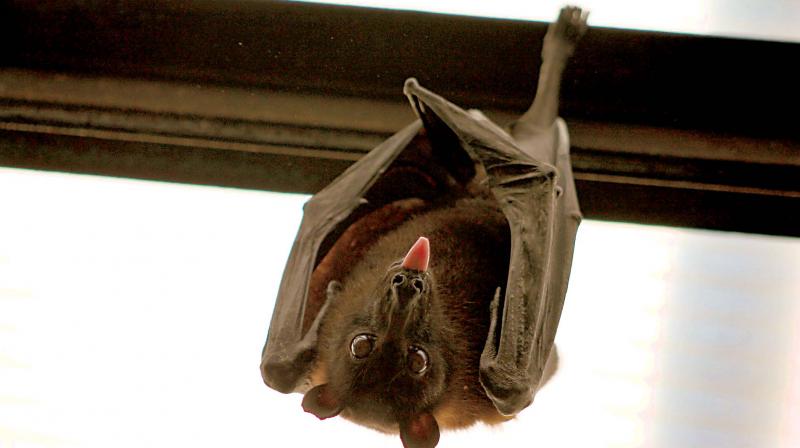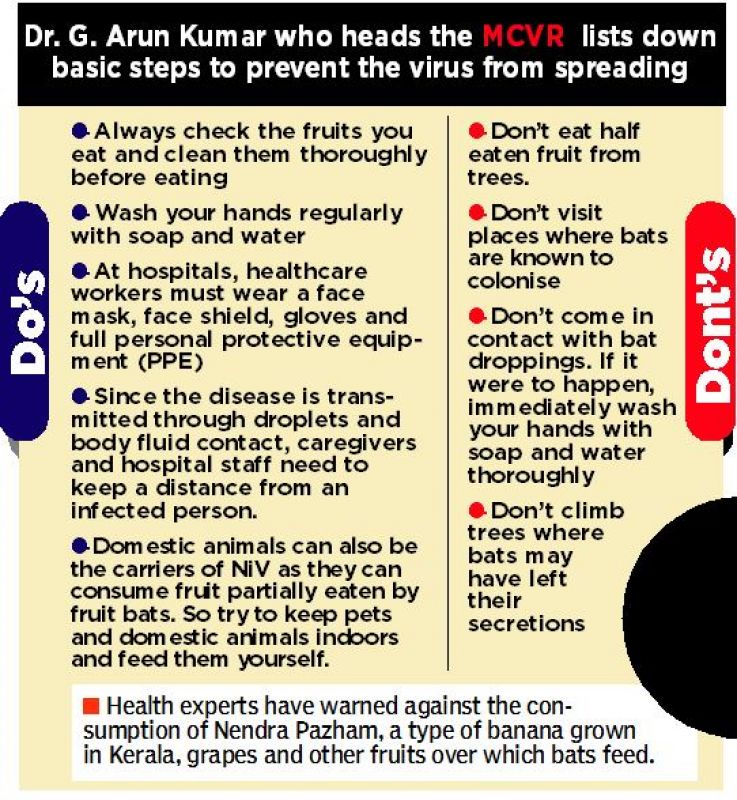Karnataka: Stay alert, Nip(ah) virus in the bud
Without a proper study on the ecology of bats, researchers say merely culling the population is not the answer.

Panic surrounding the Nipah outbreak that claimed 13 lives in Kerala, has trickled into Bengaluru, too. Here, fruit and meat sellers are facing the brunt as consumers are filled with apprehension. The zootonic (typically exists in animals) virus, believed to be transmitted by bats, has caused upheaval in the medical fraternity. Without a proper study on the ecology of bats, researchers say merely culling the population is not the answer. Meanwhile, citizens are being told not to ignore flu symptoms, which the Nipah virus tends to mimic, report Aksheev Thakur and Abilash Mariswamy
The Nipah virus outbreak in Kerala has set off alarm in Karnataka, especially as initial reports suggested a few in Mangaluru were affected by the disease. Although they have since been given the all clear, Bengalureans remain wary about buying fruit and consuming pork as the virus is known to spread through fruit bats and pigs.
With fruit bats found in large number near Sankey Tank, in Sarjapura and near the city police commissioner’s office on Infantry road, people in these areas are afraid of being infected through their droplets or the fruit they may have consumed. But BBMP Commissioner, M Maheshwar Rao, says there is no cause for panic as bats in the city are not infected by the virus. He doesn’t think there is any need to cull bats either. “Besides apart from the Central government guidelines on Nipah, we haven’t got any specific instructions on culling bats or evacuating people from areas where they are known to exist,” he says.
The officer has the backing of ecology researchers, who approve even the Kerala health department’s decision not to cull bats. “Without more evidence, culling of the bats will serve no purpose. Over 21 samples from bats and pigs were sent to Bhopal but they all turned out negative,” points out Ms Kadambari Deshpande, a PhD student with ATREE, who is focusing on the ecology of bats. She also believes that as bats are responsible for pollination, culling will only impede this process.
“While bats are natural reservoirs of some viruses, there are regions in the country where people even consume them. Unfortunately, there is no proper study on bats. As of now, all we can say is one should be cautious but not scared,” Ms Deshpande adds.
She does admit, however, that when a Nipah outbreak was first reported in West Bengal in 2001, it was found that people were infected due to their consumption of raw date palm, which the bats relish. Mr T Ganesh, a senior fellow at ATREE points out that not all fruit bats are affected by the virus and feels the identification of colonies is imperative to controlling its spread.
Pigs are another source of fear as in 1998, when Nipah was first discovered in Malaysia, initial reports suggested that they were the host and the outbreak was stopped by mass culling of the animals. Whatever the cause of the outbreak, the virus is deadly, as going by the World Health Organisation (WHO) it claimed around 300 lives across Bangladesh, India and Malaysia between 1998 and 2008.
Dr G Arunkumar who heads the Manipal Centre for Virus Research (MCVR), says those at greatest risk are the staff treating Nipah patients in hospitals as the disease spreads among people in close contact.
Without habitat, bats incubate virus
With the Nipah virus claiming over a dozen lives in its neighbouring Kerala, Karnataka’s health department has taken several precautionary measures against the spread of the virus in the state and for the treatment of those who may get infected. Its director, Dr P.L Nataraj has instructed all district hospitals to have isolation wards with three of beds ready, manned by a special doctor and nurse equipped with with masks and gloves. “We have also asked the hospitals to coordinate if any case comes to their notice,” he reveals.
The Bruhat Bengaluru Mahanagara Palike (BBMP) too issued various guidelines recently on containing the virus. For instance, if a Nipah virus (NiV) suspect is found in any hospital, be it private or government, they are expected to inform the Health Department immediately, call 104 for help, inform the health officer and distribute hand bills as part of the preventive measures. Asha workers will also be trained to create awareness among public about the virus.
Meanwhile with public concern rising - there have been 87 NiV calls to 104 Arogyavani till May 24 - the pig population in the city is being checked to ensure the animals don’t become a cause for NiV’s spread.
Doctors warn that some common signs and symptoms of the virus are headache, fever, nausea, dizziness, drowsiness, respiratory problems and confusion, which can last up to 14 to 21 days. The early symptoms can easily be confused with that of viral fever and common cold and if not taken care of, can result in a coma in a span of 24 to 48 hours.
Dr. Mahesh Kumar, Consultant, Internal Medicine, Narayana Health City says Ribavirin is the only available medicine that can control the symptoms to a certain extent if treated early. “The incubation period of the virus is three to 14 days,” he adds.
Ask him how the bats transmit the disease and he says that their loss of habitat is a huge reason. “As the habitat of the flying fox has been destroyed by human activity, the bats get stressed and hungry, their immune system gets weaker, their virus load goes up and a lot of it spills out in their urine and saliva,” he explains.
Guest Column: Focus on precaution and prevention
Nipah is a zoonotic virus, which means it typically exists in animals but sometimes can be transmitted to humans.. However, these large outbreaks are the exception as the genetic characteristics that allow the virus to flourish in one species may not be the same in another. The vast majority of viruses are probably harmless to humans. Only a small proportion has the ability to infect us and an even smaller proportion to cause disease.
Despite the recent outbreak, the Nipah virus has very limited ability to spread among humans. In fact, I believe we will be able to contain the current outbreak to Kerala. But it's important to track the Nipah virus and make sure it's not acquiring the ability to travel more easily between humans over time. Some previous outbreaks have been linked to people drinking raw date palm sap contaminated by bats, which can also transmit the virus to pigs, that in turn, can infect humans.
Virologists, who have studied Nipah in animals think that in humans, it initially targets the respiratory system before spreading to the nervous system and brain. Most patients, who die, succumb to an inflammation of blood vessels and a swelling of the brain. Cases of Nipah Encephalitis were reported from Kerala and samples were sent to the Manipal Institute of Virology which detected a lethal virus, with high levels of infectivity.
In most cases, the virus spreads by close contact and droplet infection and the treatment is limited to supportive care. So we need to concentrate more on precautionary measures and awareness to prevent the spread of the disease and ensure minimum loss of life, both of humans and animals. A hygienic and healthy living environment is important to prevent the spread of the viral infection.
Dr Ravikumar, Consultant Intensivist, BGS Gleneagles Global Hospitals


